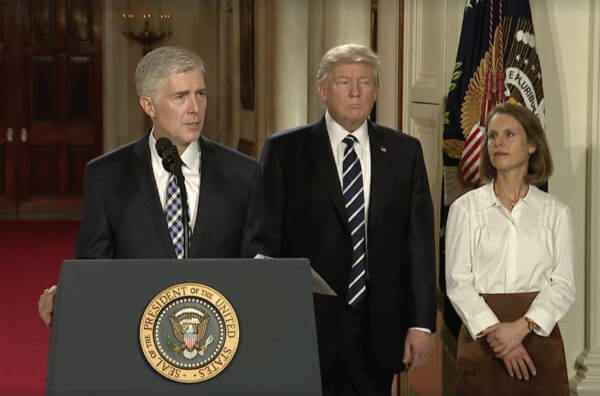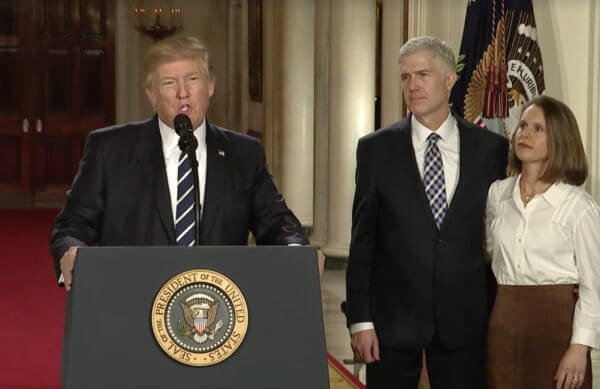North Carolina –– in a hurriedly-called special session March 23 –– passed an omnibus law attacking transgender rights, taking away, for the most part, the right of municipalities to legislate on employment and public accommodations discrimination while existing state law provides no protections based on sexual orientation and gender identity, and banning anyone from bringing a suit in state court under the state human rights law. It was signed immediately by Republican Governor Pat McCrory.
North Carolina’s is the most egregious of state anti-LGBT laws adopted as part of the backlash against the Supreme Court’s opening marriage to same-sex couples nationwide last June. These reactionary laws are, in turn, provoking condemnation and boycotts from in-state businesses and out-of-state elected officials.
Mayor Bill de Blasio, on March 28, banned all non-essential travel by city employees to North Carolina and will add Georgia to the list if Governor Nathan Deal’s veto of that state’s anti-LGBT bill is overridden by the Republican-dominated Legislature, as threatened.
New Yorkers join San Francisco, Seattle mayors in protesting draconian anti-LGBT law
“It’s quite clear that voices of conscience all over the country are expressing outrage against these decisions that are reinstating discrimination against the LGBT community,” he said. “And it is also quite clear that a lot of the corporate sector is making quite clear that it will not participate in states that have such laws. My hope is that both these states will relent, but we are certainly not going to have any non-essential travel to those states if these laws do continue in effect.”
Governor Andrew Cuomo issued an executive order, also on March 28, immediately banning all “publicly funded travel [to North Carolina] that is not essential to the enforcement of state law or public health and safety.” His order states that “protecting New York State from inadvertently financing discrimination against protected classes, including sexual orientation and gender identity, is a compelling state sanctioned government interest.” The governor also wrote that “in a free society the will of the many cannot be the basis for discrimination against the few.”
Cuomo and de Blasio join Mayors Ed Lee of San Francisco and Ed Murray of Seattle in instituting public employee travel bans to North Carolina. Such bans were also implemented by them and others in response to Indiana’s anti-LGBT “religious freedom” law last year, which was repealed after a national political and corporate furor.
Praising Cuomo’s move, Assemblymember Daniel O’Donnell, an out gay Upper Manhattan Democrat, urged support for a measure he introduced last year at the time of the Indiana controversy that would codify a ban on non-essential travel by state employees to any state adopting such an anti-LGBT law. Queens Democrat Michael Gianaris has introduced a similar measure in the Senate. The prospects for the idea in either chamber is unknown.
US Representative Alma Adams, a Democrat whose district extends from Charlotte to Winston-Salem, praised the actions of these elected officials as well as “organizations and corporations in North Carolina and across the country [that] have denounced this blatant act of discrimination. North Carolina’s governor and the Republican-controlled Legislature would rather put our local economy at risk than grant law abiding citizens equal rights.”
White House press secretary Josh Earnest, on March 28, said, “We are concerned about the potential harmful impact of this law, especially on transgender youth, and believe it is mean-spirited and sends the wrong message.”
The North Carolina law was a direct response to Charlotte passing an LGBT rights ordinance that was due to go into effect on April 1. The anti-LGBT law, the Public Facilities Privacy & Security Act, also wipes out protections on the basis of sexual orientation and gender identity in Buncombe, Mecklenburg, and Orange Counties and the cities of Asheville, Boone, Carrboro, Chapel Hill, Greensboro, and Raleigh, as well as laws that that protect people based on sexual orientation alone in Durham and Guilford Counties and the municipalities of Bessemer City, Durham, High Point, and Winston-Salem.
Scores of corporations from American Airlines to the Bank of America have denounced the new law, but few have announced actions such as moving offices out of the state. (Writing in TheIntercept.com, Jon Schwarz reports that American, Bank of America, Lowe’s, and Microsoft, while strongly critical of the new law, have all been contributors to top North Carolina Republicans, including the governor and the leaders of the State Senate and House of Representatives.) The NBA, NCAA, and ESPN’s X Games said they oppose the law and will consider moving tournaments out of the state.
Hollywood director Rob Reiner, active in the fight against Proposition 8 in California, wants the entertainment industry to boycott North Carolina, and he has vowed not to shoot a film in the state until the law is repealed. The High Point Market, the world’s largest home furnishings trade show and the “largest economic event” in the state “with an annual economic impact of $5.38 billion,” according to its release, said that “dozens of customers have cancelled plans to attend” in response to the anti-LGBT law.
The American Civil Liberties Union, Lambda Legal, and Equality North Carolina filed suit against the law on March 28, charging the state with violations of the US Constitution’s federal equal protection requirement as well as Title IX, a statute that bars sex discrimination in educational institutions receiving federal funding. A successful Title IX challenge could cost North Carolina billions in education aid.
Similar threats were used against Georgia after it passed a “religious freedom” bill that was in essence a “right to discriminate” measure. The governor’s veto there came on March 28.
The outcry against North Carolina, Georgia, and Indiana –– and Arizona in 2014 –– came in response to laws that actively promoted discrimination against LGBT people. None of those four offers any affirmative statewide LGBT protections –– which puts them in the same category as more than half of all states, a situation that has occasioned little controversy, except among the advocacy community.




































